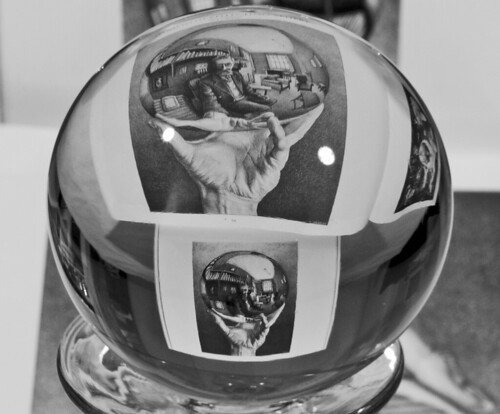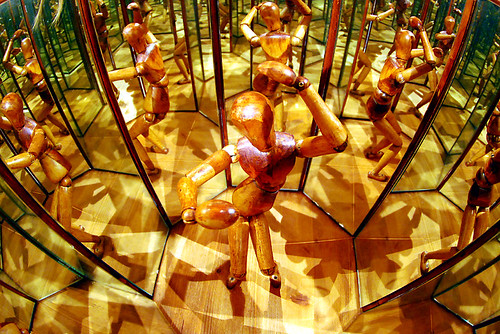[ source ]
As can be noted from the entry on Lincoln, I have been exploring the relationship between biography and reality; the structure and function of the mirror the biographer stands before the person.
Years ago, I read every available biography of Orson Welles. I wanted to explore the Wellesian persona in the fragmented, Rashoman-like manner that Citizen Kane circled around the mystery of Kane. The hope was that the multiple reflections would present a more "authentic figure" of Welles than any one alone. Would it be possible to see the man behind the curtain? Through these various perspectives, would I uncover an ontological synecdoche: a single object that stood as final summary, key, to the core of Welles' life, a "rosebud"?
The biography, the life, the being, of a Quixote, a Hamlet, a Kane, is contained within the work, the artifact, the art. It is a sphere that we can stand outside of and look into, a crystal ball upon the teller's table. It is contained, limited (in the strictest sense: described), within the context of our being (although there is argument here - see Bloom). The biographer's task of representation is always beyond, at most, concurrent with his own being. Meditation upon a person reflected in a multitude of mirrors - biographical representations - can perhaps provide a more "holographic" portrait, but the innermost thoughts, the soliloquies of self meaning, remain occluded, shadows under the surface.
There is epistemological tension in this: who or what is represented in words about a man's life? Persona is indicated above - aspects of a mask. Questions fractal along the edge between language and reality. The Mirror of Representation cracks, slivers, melts on the threshold of the the Real, the Noumenon.
It is convenient (and, admittedly, suspect) to set up dialectical positions here: one implicitly affirming the validity of language as an instrument to reflect an accurate image of the World; the other rejecting the accuracy of the representation but still employing the language, oblivious - willfully so - to the implicit implications. Slice a dead horse as example: one holding the Mirror up to the World, believing the reflections to be real; the other attempting the shatter the Mirror to show that what is reflected is a false representation of... what? If not the World, perhaps the Subjective Real. The Mirror remains. Language is always transcendent over its representations.
In Mimesis
As recently as the nineteenth century, and even at the beginning of the twentieth, so much clearly formulable and recognized community of thought and feeling remained in those countries that a writer engaged in representing reality had reliable criteria at hand by which to organize it. At least, within the range of contemporary movements, he could discern certain specific trends; he could delimit opposing attitudes and ways of life with a certain degree of clarity. To be sure, this had long since begun to grow increasingly difficult. Flaubert (to confine ourselves to realistic writers) already suffered from the lack of valid foundations for his work; and the subsequent increasing predeliction for ruthlessly subjectivistic perspectives is another symptom. At the time of the first World War and after - in a Europe unsure of itself, overflowing with unsettled ideologies and ways of life, and pregnant with disaster - certain writers distinguished by instinct and insight find a method which dissolves reality into multiple and multivalent reflections of consciousness. That this method should have been developed at this time is not hard to understand.
But the method is not only a symptom of the confusion and helplessness, not only a mirror of the decline of our world. There is, to be sure, a good deal to be said for such a view. There is all these works a certain atmosphere of universal doom: especially in Ulysses, with its mocking odi-et-amo hodgepodge of the European tradition, with its blatant and painful cynicism, and its uninterpenetrable symbolism - for even the most painstaking analysis can hardly emerge with anything more than an appreciation of the multiple enmeshment of motifs but with nothing of the purpose and meaning of the work itself. And most of the other novels which employ multiple reflection of consciousness also leave the reader with an impression of hopelessness. There is often something confusing, something hazy about them, something hostile to the reality that they represent. We not infrequently find a turning away from the practical will to live, or delight in portraying it under its most brutal forms. There is a hatred of culture and civilization, brought out by means of the subtlest stylistic devices which culture and civilization have developed, and often a radical and fanatical urge to destroy. [emph. mine]
Auerbach wrote Mimesis in exile from the Third Reich - without access to any of the primary texts. It was published in 1946. You can hear the thunder of the War in his language, the evening light of the "European tradition" pulses within the words. Yet, over half a century later, Joyce's love-hate montage resides within the same canonical zoo as Swift, Milton, Dante and Shakespeare. And whatever the aberrations of Modernism might have been, "the radical and fanatical urges to destroy" there were nothing compared to the Rough Beast that has now slouched into view.
An excerpt from an interview with Slavoj Žižek not long after the events of September 11, 2001:
Has 11 September thrown new light on your diagnosis of what is happening to the world?
Slavoj Žižek: One of the endlessly repeated phrases we heard in recent weeks is that nothing will be the same after 11 September. I wonder if there really is such a substantial change. Certainly, there is change at the level of perception or publicity, but I don't think we can yet speak of some fundamental break. Existing attitudes and fears were confirmed, and what the media were telling us about terrorism has now really happened.
In my work, I place strong emphasis on what is usually referred to as the virtualisation or digitalisation of our environment. We know that 60 percent of the people on this Earth have not even made a phone call in their life. But still, 30 percent of us live in a digitalised universe that is artificially constructed, manipulated and no longer some natural or traditional one. At all levels of our life we seem to live more and more with the thing deprived of its substance. You get beer without alcohol, meat without fat, coffee without caffeine...and even virtual sex without sex.
Virtual reality to me is the climax of this process: you now get reality without reality...or a totally regulated reality. But there is another side to this. Throughout the entire twentieth century, I see a counter-tendency, for which my good philosopher friend Alain Badiou invented a nice name: 'La passion du réel', the passion of the real. That is to say, precisely because the universe in which we live is somehow a universe of dead conventions and artificiality, the only authentic real experience must be some extremely violent, shattering experience. And this we experience as a sense that now we are back in real life.
Do you think that is what we are seeing now?
Slavoj Žižek: I think this may be what defined the twentieth century, which really began with the First World War. We all remember the war reports by Ernst Jünger, in which he praises this eye-to-eye combat experience as the authentic one. Or at the level of sex, the archetypal film of the twentieth century would be Nagisa Oshima's Ai No Corrida (In The Realm Of The Senses), where the idea again is that you become truly radical, and go to the end in a sexual encounter, when you practically torture each other to death. There must be extreme violence for that encounter to be authentic. [emph. mine]
Another emblematic figure in this sense to me is the so-called 'cutter'- a widespread pathological phenomenon in the USA. There are two million of them, mostly women, but also men, who cut themselves with razors. Why? It has nothing to do with masochism or suicide. It's simply that they don't feel real as persons and the idea is: it's only through this pain and when you feel warm blood that you feel reconnected again. So I think that this tension is the background against which one should appreciate the effect of the act.
It has been my project for many years to believe in the language as living thing, as having authentic being. In this manner, I often imagine the requirements for a biography of Language, not as a chronology of facts or historical events, but as a means of penetrating to into the core of Being, of unfolding the mystery. I have, in fact, been obsessed with this of late. This concern has been at the core of me and through all the violence and brutality that I have brought upon it with my attempts at creation and explanation, it has retained its gem-like flame.
From the Letter on Humanism by Heidegger:
Language is the house of Being. In its home man dwells. Those who think and those who create with words are the guardians of this home.








No comments:
Post a Comment